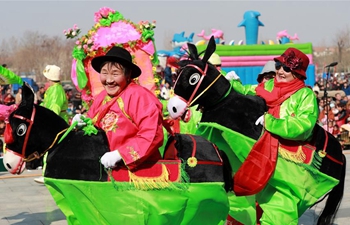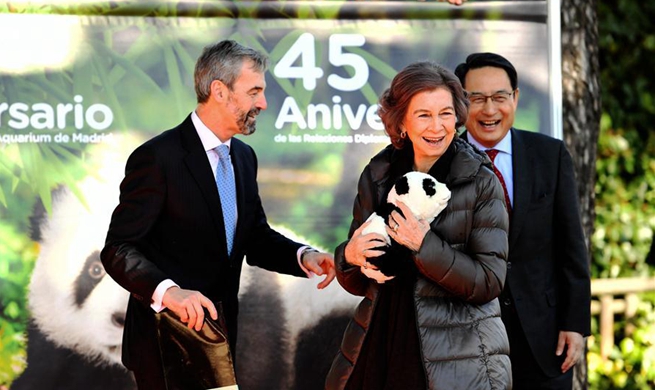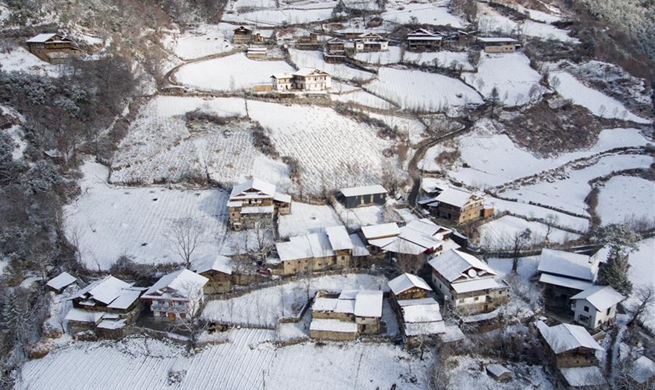BEIJING, Feb. 24 (Xinhua) -- A hit documentary has made high-quality iron pans a must-have item in Chinese kitchens, sparking fears the boom could damage the industry.
The first episode of the third season of Chinese food documentary "A Bite of China," produced by China Central Television, premiered Monday evening. The documentary depicts Chinese food culture, particularly the relationship between people and food.
With eight episodes each lasting 50 minutes, this season focuses on areas such as kitchenware, snacks, banquets, chefs and desserts
The first episode focused on a particular hand-made iron pan produced in Zhangqiu District in east China's Shandong Province. According to the documentary, a Zhangqiu Iron Pan needs to go through 12 procedures, be put in a temperature of 1,000 degrees Celsius and be beaten 36,000 times until it becomes "as clear as a mirror."
The episode helped sales of Zhangqiu Iron Pans to skyrocket overnight, and sales on the pans on the Taobao e-commerce website increased almost 6,000 times.
According to Alibaba, which runs Taobao, the iron pans are most popular in Shandong, followed by Jiangsu, Beijing and Guangdong.
Liu Zimu, who runs the pan factory in the documentary, said that one hour after the episode's premier, he sold all 2,000 pans in his store.
"We have about 50 craftsmen making the pans, and we are able to produce a little more than 100 pans every day," Liu said. "So far, we have received orders that will take two years to deliver. The history of the iron pans spans 1,000 years, and hand-made ones are better at heat conduction than those produced by machines."
"The hand-made pans are not sticky after tens of thousands of times of beating," Liu said. "They are better for cooking."
According to Liu, prices of the pans range from 300 yuan (47 U.S. dollars) to more than 1,000 yuan. A pan made by a seasoned craftsman in Liu's factory can fetch 1,299 yuan.
While the popularity of the pans has brought big bucks, Liu worries about the development of the industry.
"I am really happy that the craftsmanship is getting more attention and the pan makers are getting more respect," Liu said. "But making such pans is very complicated, and our capacity is quite limited, so it is inevitable that there will be fake ones on the market."
Liu said that even some iron pans made in Japan had been labeled as Zhangqiu Iron Pans, not to mention a number of poorly-made copies.
"The market is getting a little irrational," Liu said.
As orders overwhelmed factory capacity, Liu has closed his online store.
"Making the pans is an art, and I don't want money to taint the art," Liu said.
Liu said that making the pans is not easy. A craftsman needs to use a hammer of at least 7.5 kg to beat the pans tens of thousands of times, a "very tough job."
Zhangqiu pan-making culture once faced difficulties in being passed on, as the industry was threatened by mass production by machines, Liu said. As a result, many craftsmen switched jobs to survive.
The situation did not get better until recently, when the public realized the quality of the iron pans.
To help pass on pan-making culture, Liu and his peers have recruited many apprentices.
In Liu's factory, apprentices are paid to attend training sessions, and senior craftsmen enjoy high subsidies to "let them live better lives."
Before the documentary fervor, Liu's pans were already finding their way into other countries. Last year, his pans were purchased by consumers in more than 20 countries and regions, including the United States, Russia and Australia.
"The pans are particularly popular among overseas Chinese," Liu said. In late 2017, a British man bought more than 100 pans. The pans were later sold out when the man returned to Britain, according to Liu.
"I hope that after the documentary fervor, the public can view the art more rationally," Liu said.
"The public need to allow the craftsmen focus on making good-quality, genuine pans rather than churning out a big number of pans just for the sake of money," he said. "We are not just making pans; we are passing on a traditional art."

















